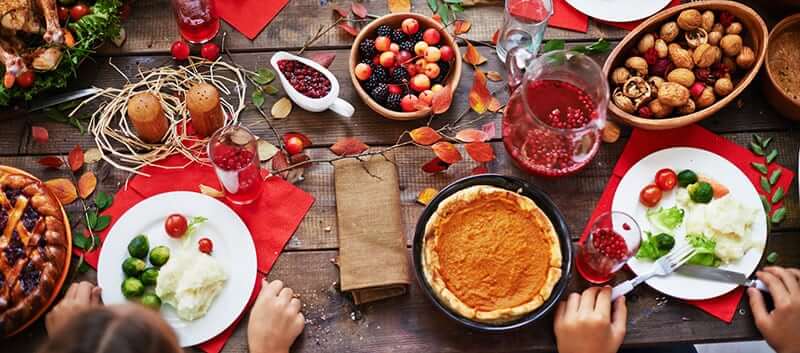It is discouraging for a patient with diabetes to attend a follow-up visit 8 weeks after an initial consultation and gain 6 pounds instead of accomplishing the recommended 1-2 pound reduction in weight per week. This should have translated into an 8-16 loss over the 2 month period. As always, our most important concern is blood sugar control when a visit is scheduled but in the patient’s mind, loss of body weight is just as important, especially when you can fall easily into the holiday eating trap.
At this patients initial visit, he was “pumped up” to get on track with an eating plan, portion control and exercise program while changing his previous lifestyle to a more healthful one. Since he was newly diagnosed, we had talked about eliminating empty calories in fruit juice, fruit smoothies, regular soda as well as sweet tea and lemonade. We reviewed how alcohol had empty calories and limiting or eliminating alcohol would be helpful. Unfortunately, he recently changed jobs and they have been “wining and dining him for the last 2 months” which probably accounted for the weight gain. He misinterpreted the information about drinking alcohol and thought having 2-3 non-alcoholic strawberry daiquiris was a great choice. After we discussed that each drink had about 600-800 calories, he understood where some of the weight was coming from. He admitted that many current dinner meetings encouraged large sit down meals with discussions and presentations which amounted to a lot of mindless eating. We reviewed practical guidelines and since holiday season is almost here, I wanted to share some of our discussion.
Avoid “Zombie Eating”
Try to escape from “zombie eating” this holiday season. This term was labeled by Dr. Susan Albers, author of Eating Mindfully. People enter a party and tend to get caught up with socializing while filling their plate. This limits their ability to pick up on hunger cues and causes them to eat more. Seeing the abundant food spread actually stimulates the brain and if caught up in conversation makes it easier to grab and eat. “Chat and chew” distracts us from mindful decisions and choices. It is especially difficult when foods are in bite size appetizers and finger foods which you can easily eat quickly and in bulk. “Eating mindlessly” makes it much easier to go overboard. Even when you realize you have “already blown it” and plan to do better tomorrow, it may make you feel sick that day. Try to plan ahead so you don’t find yourself in that particular situation.
Be Mindful of Your Holiday Eating Habits
Instead of falling into the holiday eating trap, start by being mindful of your eating. Do not hover around the buffet table and grab as you go. Simple one-bite selections go down too quickly and you tend to overeat. Actually make a small plate with a variety of bright colored foods for added appeal and sit down at a quiet table to get away from the distractions. Try to pick foods that require a knife and fork and cut into smaller bites one cut at a time.
Try Deep Breathing
Think about how deep breathing works for stress reduction and how it brings you into the present moment. Consider using this technique for a holiday dinner or regular meal. Whether you are over hungry by skipping a previous meal or confronted with too many choices during a holiday gathering, start by taking 3 conscious deep breaths. Close your eyes and focus on what you really need to end hunger. “Actualize” and understand if you are hungry or just eating as part of a reaction to the food and the setting.
Focus on the Different Events
Prior to attending your function, really focus on the different events. Decide what feeling pops up when you are dealing with a work related party, a social gathering with friends or a family event. Each scenario may evoke a different response. Some people are more at ease at a family party and fill up their plate 2-3 times without concern since they are so comfortable. Others are more on edge at a family event since family usually is aware of your diabetes and can be more critical of your plate and food choices. Tune in to what you need and what to expect prior to the function and do not put yourself on auto-pilot for eating.
Avoid Sugary Beverages

Go on an Adventure and Find New Recipes
Get out of your “recipe rut” and explore new recipes which will satisfy your cravings during this holiday season. You will also be able to bring your own exciting dish to the celebration and share your new cooking skills. Either invest in cookbooks (many people love to collect picture/recipe cookbooks), subscribe to a healthy/diabetes cooking magazine or get online and find a trustworthy, reliable source such as the American Diabetes Association and print out some awesome recipes. They will tweak the famous sweet potato pie, macaroni and cheese or stuffing recipe. You will have fabulous food with less calories and carbohydrates. This will reduce the regular holiday eating temptations.
Eat Healthy Fats
Think about having a snack with healthy fat prior to going to your event to help keep you satiated, keep hunger pangs down and keep you from picking continuously. Have a small plain full fat Greek yogurt which has less than 200 calories, is low in carbohydrate, high in protein and has less than 5 grams of saturated fat. It will taste creamy, thick and satisfying and help you prepare for the upcoming buffet. Have eggs for breakfast with a piece of whole grain toast smeared with avocado the morning of an afternoon feast. The healthy fat in this meal is good for you and may prevent overindulging later in the day. An egg has 6 grams of protein and 1.5 grams of saturated fat. Reach for a cheese stick and 2 whole grain crackers prior to leaving to take the hunger edge off. Forget going for “the kill” to eat everything on the table to mess up blood sugars and your weight.
Be Conscious About Eating
Stay conscious to the color, texture, flavor and aroma of what you are going to eat. Most times casseroles and creamy sauces are beige or brown containing high fat, sodium and calories. Think about foods with bright hews including orange, green, red, yellow and purple. These foods are usually fresh with only one basic ingredient. Look for foods that are crunchy and take time to chew compared to a rich saucy pasta dish that slides down quickly.
Slow it Down!
One of the biggest problems related to overeating is eating too fast; many people tend to simply “inhale their food”. Use a smaller plate with small utensils and take one bite at a time. Use any trick you can to slow down eating to help your brain register that it is full.
Focus on Quality Over Quantity
A meal should include high quality protein, complex carbohydrates, free vegetables and healthy fats. These meals will give you energy and help blood sugars stay stable. Don’t think of eating just a heaping plate of turkey or just a huge portion of stuffing as a complete holiday meal. Eat your meal “to feel good” not “to be good.” Understand at the end of the event you want to feel satiated not stuffed, bloated or off the charts with your blood sugars or that you have “cheated”.
Get Some More Sleep
According to a recent study in the journal Sleep, “volunteers who had their sleep restricted for 4 nights reported more hunger and had a harder time resisting junk food snacks than those who had adequate rest”. Another study published in the Netherlands showed that “men who had short or long sleep had lower insulin sensitivity than those who slept 7-8 hours a night. Some of this was dependent on the amount of deep sleep men experienced but more research is needed”. The bottom line is adequate sleep allows for better decision making and helps you avoid mindless eating. Blood sugars will surely stay in a safer range.
Try to reflect on what the holiday season actually means to you which is more than the pecan pie. Examine your deep personal relationships and good quality interactions. Think about the people who prepared the food not the food the people prepared. Reflect on the good stuff and the gratitude of the season and as always stay happy and healthy!
Have a question or comment? Post below or email me at [email protected] if you would like to share them with ADW diabetes.
NOTE: Consult your Doctor first to make sure my recommendations fit your special health needs.













Leave A Comment